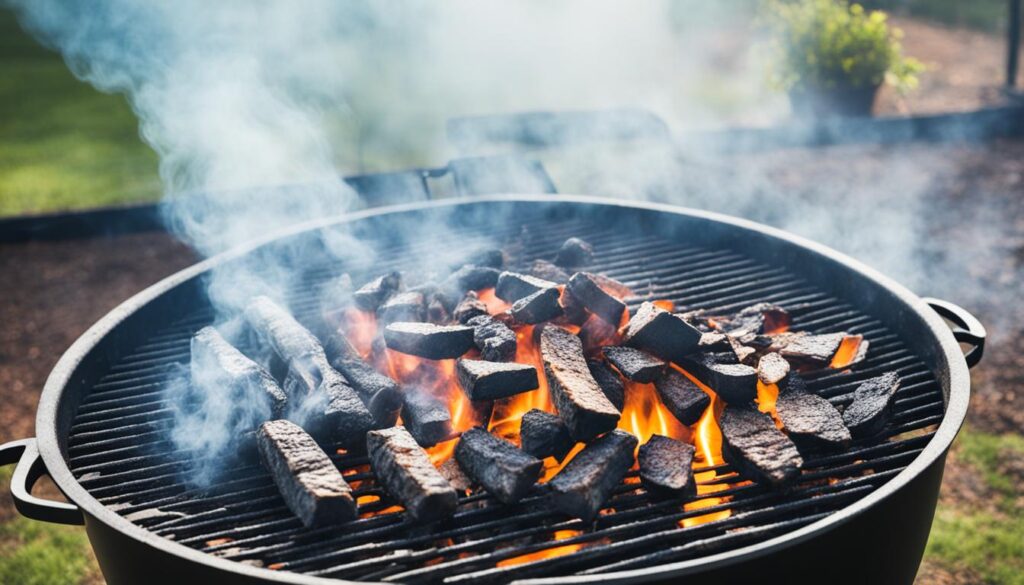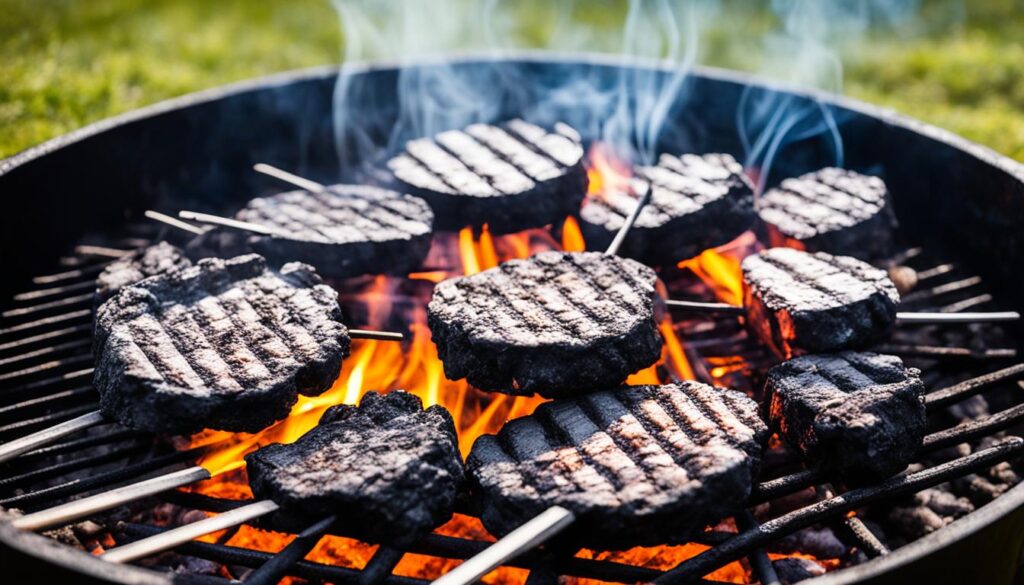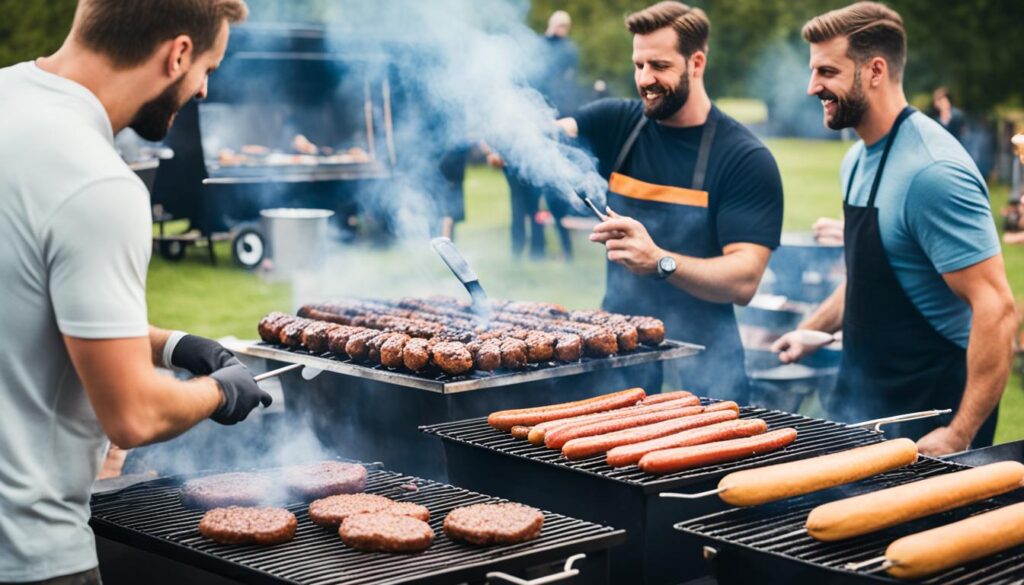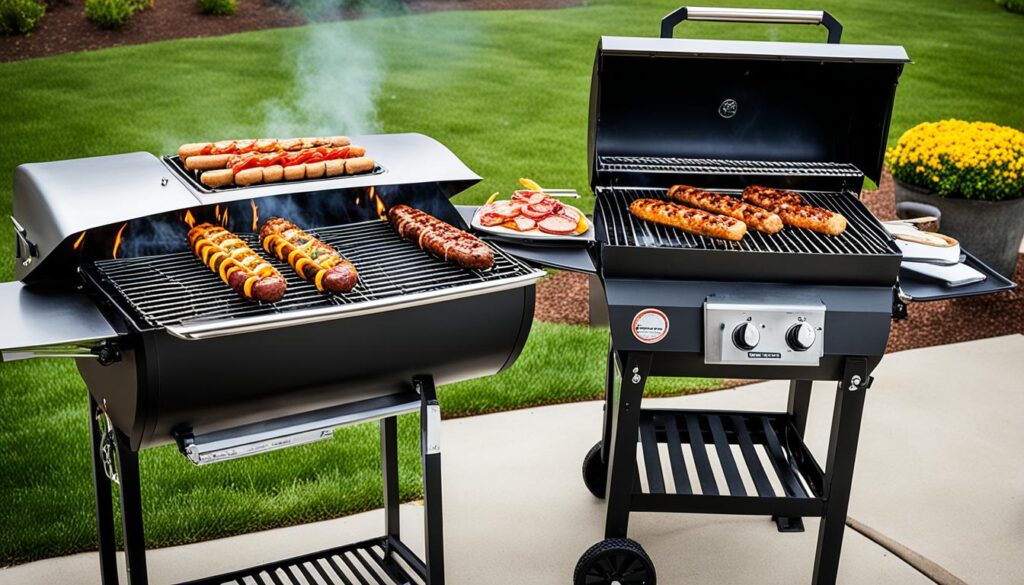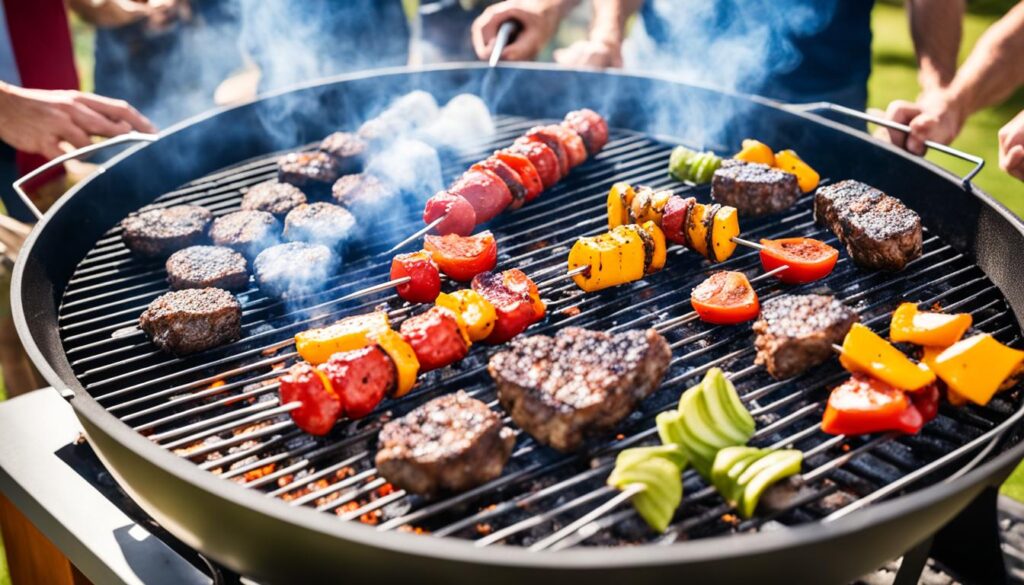Before firing up your BBQ, it’s important to give it a thorough cleaning to ensure hygiene and avoid any cases of food poisoning. Proper grill maintenance involves regular cleaning and knowing when to burn off any residue. Here are some helpful BBQ cleaning tips and the best time to clean your grill for optimal performance.
Key Takeaways:
- Burning off food residue is an effective method, especially for gas barbecues.
- Charcoal barbecues should have the grill burned off before the next use.
- Regularly cleaning your BBQ ensures proper hygiene and safety.
- Thoroughly clean the grates every two months and at least twice in a grilling season.
- Use the right cleaning tools and techniques for optimal results.
The Importance of Cleaning Your BBQ
Regular cleaning of your BBQ is essential to maintain its performance and prevent the buildup of bacteria and carbon deposits. Leftover food bits can attract bacteria and affect the taste and safety of your food. To ensure your BBQ stays in top condition, it’s important to establish a cleaning schedule that fits your usage frequency.
- After each use, give the grill a quick scrub to remove any residue.
- Thoroughly clean the grates every two months to prevent grease buildup.
- Plan for a comprehensive cleaning at least twice during the grilling season.
Cleaning your BBQ regularly not only ensures hygiene, but it also helps maintain the flavor and quality of your food. By following a consistent cleaning routine, you can enjoy delicious meals without the worry of bacteria or carbon deposits affecting your grilling experience.
How to Clean Your BBQ
To clean your BBQ and ensure it’s in tip-top condition, follow these simple steps:
- Start by preheating your BBQ for at least 10-15 minutes. This will help burn away any stuck-on food and bacteria, making it easier to clean.
- If you’re using a gas grill, take a wire brush and dip it into warm, soapy water. Scrub the grates thoroughly to remove any grease or residue. For charcoal grills, scrape away any caked-on charcoal dust and debris using a grill brush.
- Next, soak the grates and other removable parts in warm, soapy water for at least 30 minutes. This will help loosen any stubborn residue.
- After soaking, take a scrub brush or sponge and scrub the grates and other parts clean. Make sure to scrub all surfaces thoroughly to remove any leftover grime.
- Rinse all surfaces of the BBQ with clean water to remove any soap or cleaning solution residue.
- If you’re dealing with stubborn residue, create a paste using mild dish soap, vinegar, and baking soda. Apply the paste to the affected areas and let it sit for a few minutes. Then, scrub the residue away with a brush or sponge and rinse clean.
- Once the BBQ is clean, make sure to dry the grates and other parts completely. This will prevent any rust or corrosion from forming.
- Finally, apply a light coating of vegetable oil to the grates to prevent sticking and add a layer of protection.
By following these BBQ cleaning tips, you’ll ensure your grill stays in great condition and ready for your next cookout!
Cleaning Side Tables
When it comes to BBQ cleaning tips and maintaining your grill, don’t overlook the importance of cleaning the side tables. Studies have shown that these tables can harbor bacteria, especially after raw meat has been placed on the surface. To ensure proper hygiene, it’s essential to clean and sanitize the side tables regularly.
One of the best ways to clean side tables is by using an antibacterial cleaner. This will help eliminate any bacteria and germs that may be present. Simply spray the cleaner onto the tables and use a cloth or sponge to wipe them down thoroughly. Pay attention to any crevices or corners where dirt and grime can accumulate.
For tougher stains or stubborn residue, you can use a mild detergent mixed with warm water. Apply the solution to the surface of the side tables and scrub gently with a non-abrasive sponge or brush. Rinse with clean water and wipe dry with a soft cloth or towel.
Regularly cleaning the side tables not only helps to keep your BBQ area looking clean and inviting but also ensures that you’re maintaining a hygienic environment for food preparation. So, don’t forget to include the side tables in your grill cleaning routine for a comprehensive BBQ maintenance guide.
Take a look at the image below to see an example of a clean and organized BBQ setup:
Keep your BBQ in tip-top shape by incorporating these cleaning tips into your regular grill maintenance routine. By paying attention to the smallest details, such as cleaning the side tables, you’ll create a safe and enjoyable cooking experience for you and your guests.
Choosing the Right Cleaning Tools
When it comes to cleaning your BBQ, having the right tools is essential. One commonly used tool is a wire cleaning brush. However, it’s important to be aware of the associated risks, such as wire bristles breaking off and sticking to your food. To avoid any potential health hazards, consider alternative cleaning options. Scraper tools, like those made of a sturdy material, can effectively remove grime and grease from your grill. Another option is to use crumpled aluminum foil as a DIY cleaning tool. It provides good abrasion without the safety concerns of wire brushes.
For those concerned about wire brushes, bristle-free grill brushes are a great alternative. These brushes are designed with bristle-free heads that use innovative technology to clean your grill grates. They provide effective cleaning without the risk of wire bristles sticking to your food. Bristle-free grill brushes are ideal for quick cleanings between grilling sessions.

Common Grill Maintenance Mistakes
When it comes to grill maintenance, there are some common mistakes that many people make. By avoiding these errors, you can ensure proper grill maintenance and prolong the lifespan of your grill.
- One common mistake is relying solely on the high heat of the flames to kill bacteria. While the heat can help, it’s not 100% effective. It’s essential to give the flames time to clean the grill properly.
- Neglecting to preheat the grill properly is another mistake. This can result in food sticking to the grates, making it difficult to clean. Preheating allows the grates to reach the desired temperature, reducing the chances of food sticking.
- Another mistake is failing to clean the grill immediately after use. Grease and residue can build up, creating a breeding ground for bacteria. Cleaning the grill after each use helps maintain hygiene and prevents the accumulation of harmful substances.
By avoiding these common mistakes and following proper grill maintenance practices, you can ensure that your grill remains in good working condition and provides you with many enjoyable barbecues to come.
Why Cleaning a Grill Matters
Cleaning your grill is an essential part of proper grill maintenance. Not only does it ensure hygiene and safety, but it also plays a crucial role in maintaining even heat distribution and preventing premature failure of parts. Neglecting to clean your grill regularly can result in the accumulation of carbon deposits on every surface, which can significantly affect its performance.
When you cook on a dirty grill, grease and sugary sauces can stick to these deposits, providing a breeding ground for bacteria. This can lead to food-borne illnesses and compromise the quality and flavor of your grilled food. Regular cleaning is the key to maintaining a clean and healthy grill that produces delicious meals.
To illustrate the importance of cleaning a grill, imagine cooking a steak on a greasy, dirty grill. The residue from previous cooking sessions can affect the taste and texture of the meat, resulting in an unpleasant dining experience. Additionally, the buildup of carbon deposits can cause uneven heating, leading to undercooked or burnt portions of food.
The Impact of Grease and Sugary Sauces
When you cook meat that contains fats or marinate it in sugary sauces, some of the grease and sauce inevitably drips onto the grill grates or other surfaces. If not cleaned properly, this residue can become a sticky layer that harbors bacteria, creating an unsanitary cooking environment.
Regular cleaning helps remove grease and sugary sauce residues, ensuring a clean surface for your next grilling session. So, the next time you fire up your grill, you can have peace of mind knowing that you’re cooking on a clean and safe surface.
Ensuring Even Heat Distribution
Carbon deposits that accumulate on the grill grates and other surfaces can affect the heat distribution of your grill. The buildup can create hot spots and cold spots, resulting in unevenly cooked food. By regularly cleaning your grill, you help maintain optimal heat distribution, ensuring that your food is cooked evenly and to perfection.
Preventing Premature Failure of Parts
A well-maintained grill is less likely to experience mechanical and structural problems. Carbon deposits, grease, and other debris can corrode or damage grill components over time. Regular cleaning helps prevent the buildup of these substances, prolonging the lifespan of your grill and saving you from costly repairs or replacements.
The importance of cleaning a grill cannot be overstated. It not only ensures hygiene and safety but also helps maintain even heat distribution and prevents premature failure of parts. Regular cleaning is a simple yet effective way to prolong the life of your grill and enhance your grilling experience.
So, the next time you enjoy a mouthwatering barbecued meal, thank proper grill maintenance for the quality and flavor of your feast.

The Need for Deep Cleaning
While regular cleaning after each use is important, periodic deep cleaning is necessary to remove stubborn carbon deposits and ensure optimal performance of your BBQ. Deep cleaning involves several steps that will help you maintain the cleanliness and functionality of your grill.
To start the deep cleaning process, you will need to remove all the removable parts of your BBQ, such as grates, burners, and drip pans. Soak them in warm, soapy water to loosen any grease or food residue that may have accumulated over time. This step will help make the scrubbing process much easier and more effective.
After soaking, scrub the grates and other parts with a wire brush to remove any tough residue. If there are stubborn stains or buildup, you can create a paste using equal parts vinegar and baking soda. Apply the paste to the affected areas and let it sit for a few minutes before scrubbing. This natural solution is an effective way to tackle the toughest grime on your BBQ.
Don’t forget to pay attention to the inside of the grill as well. Use a vacuum cleaner to remove any loose debris or ash that may have accumulated. This will help improve the airflow and prevent any potential blockages that can affect the performance of your BBQ.
Lastly, clean the exterior surfaces of your grill using a mild soapy solution and a soft cloth. This will remove any dirt or grease that may have accumulated on the outside of your BBQ.
By going through these deep cleaning steps on a regular basis, you can ensure that your BBQ remains in top condition and continues to deliver delicious grilled meals every time.
Choosing the Right Grill Cleaning Equipment
When it comes to keeping your grill clean and ready for your next BBQ, having the right cleaning equipment is essential. Here are some must-have tools and supplies:
- A long-handled wire brush: Ideal for scrubbing the grill grates and removing stuck-on food particles.
- A wire bottle brush: Perfect for cleaning hard-to-reach areas, such as the inside of burner tubes.
- A bucket for soaking: Use this to soak the grates and other removable parts in warm, soapy water.
- Warm water: Necessary for creating a cleaning solution and rinsing off surfaces.
- Grease-cutting dish soap: Helps to remove grease and grime from your grill.
- Cleaning vinegar: Effective for tackling tough stains and buildup.
- Baking soda: A natural abrasive that aids in removing stubborn residue.
- Rubber gloves: Protect your hands from cleaning chemicals and hot water.
- Scouring sponges: Use these to scrub away grime without damaging the grill surfaces.
- Cotton rags: Ideal for drying and polishing the grill after cleaning.
It’s important to avoid using chemicals that can impart off-tastes to your food. Instead, opt for stainless steel cleaners specifically designed for stainless steel exteriors. These cleaners will keep your grill looking shiny and new without leaving any unwanted residue.
When using wire brushes, it’s vital to be cautious due to the potential dangers of loose bristles. Before and after each use, inspect the brush for any signs of bristle breakage. If you notice loose bristles, replace the brush to prevent them from accidentally getting into your food.

With the right grill cleaning equipment, you can effectively remove grease, carbon buildup, and food residue, ensuring your grill stays in top shape and ready for your next delicious barbecue feast.
Step-by-Step Process for Cleaning Your Grill
When it comes to proper grill maintenance and keeping your grill in top condition, the cleaning process plays a crucial role. Follow these step-by-step instructions to ensure a thorough and effective grill cleaning process.
- Preheat the grill: Before starting the cleaning process, preheat the grill to a high temperature. This will help to burn away any stuck-on food residue and make it easier to clean.
- Soak the grates and removable parts: While the grill is preheating, remove the grates and other removable parts and place them in a bucket of warm, soapy water. Allow them to soak for a few minutes to loosen any grease and grime.
- Clean the firebox: Once the grates are soaking, it’s time to clean the inside of the firebox. Use a plastic putty knife or scraper to remove any debris or carbon buildup. Use a wet/dry vacuum to suck out any remaining ash or debris.
- Scrub the grates and other parts: Take the grates and other removable parts out of the soapy water and scrub them with a wire brush to remove any stubborn residue. For tougher stains, make a paste using vinegar and baking soda and apply it to the grates. Scrub thoroughly to get rid of any remaining grime.
- Rinse all surfaces: After scrubbing the grates and other parts, rinse them thoroughly with clean water to remove any soap residue. Make sure to rinse all surfaces, including the firebox, to ensure a clean and hygienic grill.
- Clean stainless steel surfaces: If your grill has stainless steel surfaces, use a dedicated stainless steel cleaner to polish and restore their shine. Follow the instructions on the cleaner’s packaging for the best results.
- Reassemble and season the grill: Once all the parts are clean and dry, reassemble the grill carefully, ensuring that everything is in its correct place. Before using the grill again, give it a light coating of vegetable oil to prevent rust and provide a non-stick surface.
Following this step-by-step process will help you achieve proper grill maintenance and ensure that your grill is clean and ready for your next barbecue.
Final Touches and Tips
After cleaning your grill, it’s time to add those final touches that will keep it in top condition for your next BBQ. Here are some tips to follow:
- Use microfiber towels to wipe down and dry all surfaces of your grill. This will help remove any remaining moisture or cleaning residue.
- If your grill has stainless steel surfaces, you can use stainless steel cleaners for a final touch. However, make sure to remove any streaks and work in cooler weather to prevent the cleaner from evaporating too quickly.
- Pay attention to the burners and check for signs of corrosion or blockage. Clean them if necessary to ensure proper gas flow and heat distribution.
- Inspect the grill grates for any chips or rust. If you notice any damage, consider replacing the grates for optimal cooking performance.
- For cast-iron grates, apply a light coating of oil to protect them from rust and help prevent food from sticking.
- Reassemble all parts of your grill properly, ensuring that everything is securely in place.
- Perform a final burn-off by preheating your grill for a few minutes. This will help remove any remaining cleaning residue and season the grates for better flavor.
By following these final touches and tips, you’ll ensure that your grill is clean, well-maintained, and ready to cook up delicious meals for your family and friends.
Conclusion
Proper grill maintenance and regular cleaning are vital for keeping your BBQ in excellent condition. By following the recommended cleaning schedule and implementing the right tools and techniques, you can ensure proper hygiene, prevent food-borne illnesses, and extend the lifespan of your grill. With a clean and well-maintained BBQ, you can enjoy your barbecues with confidence, knowing that your grill is ready to cook delicious food.

